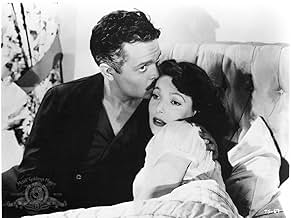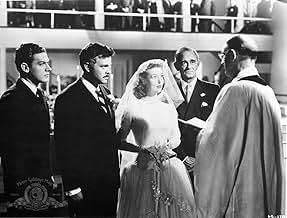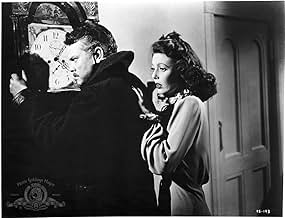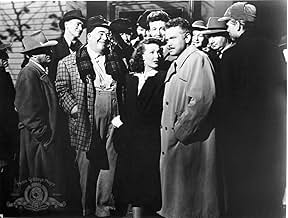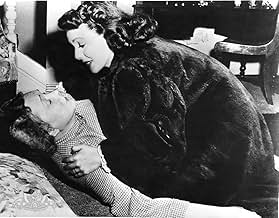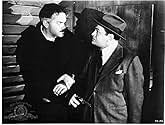An investigator from the War Crimes Commission travels to Connecticut to find an infamous Nazi.An investigator from the War Crimes Commission travels to Connecticut to find an infamous Nazi.An investigator from the War Crimes Commission travels to Connecticut to find an infamous Nazi.
- Nominated for 1 Oscar
- 2 nominations total
David Bond
- Student
- (uncredited)
John Brown
- Passport Photographer
- (uncredited)
Nancy Evans
- Undetermined Role
- (uncredited)
Adolph Faylauer
- War Crimes Commision Member
- (uncredited)
Fred Godoy
- Undetermined Role
- (uncredited)
Theodore Gottlieb
- Fairbright
- (uncredited)
Joseph Granby
- Undetermined Role
- (uncredited)
Ethan Laidlaw
- Todd
- (uncredited)
7.330.4K
1
2
3
4
5
6
7
8
9
10
Featured reviews
Who Says Fear of Terrorism Is a Contemporary Problem
Who says that fear of terrorism is a new development, post 9/11. Imagine the fears and exposed nerve endings of the average towns person living in the shadow of World War II. There was the fear of infiltration by the Nazis with their secret agents, blending in with our everyday citizens. Orson Welles plays just such a guy. He is kind, pleasant, quiet, and very dangerous. He even sets about marrying a woman as part of his secret plot. Edward G. Robinson, who normally would have been the heavy, plays a tired, hard working investigator who is leaving no stone unturned. The plot is intricate, though predictable, and the whole thing is hard to take your eyes off. Welles was a great director, but perhaps an even better actor. He keeps this thing going, raising it above the common fair of the time. The writing keeps the good guys at bay, but the clues continue to sit there, ripe for discovery. The clock tower is a great symbol, continuing to remind us of the urgency of everything. The dramatic irony presented makes us continually uncomfortable. We are treated to the movements and activities of the villain, and being let in, it makes everything more enjoyable. See this if you can.
Orson welles directs and stars in vivid postwar Nazi hunt.
A little much in parts, particularly the use of headlight direction that Welles loves to employ, nevertheless, this is a film that rates three stars in the Wellesian collection.
Edward G. Robinson is superb as the laid-back, all-knowing, in-your-face detective and Loretta Young scores as Orson's wife but it's big Billy House who is the real scene-stealer. House plays the man who owns the self-service store in town who likes playing checkers with his customers.
Welles, who looks a little strange--no doubt to match up with the title-provides a commanding performance throughout in a film that reflects the era's revulsion with the Nazi dream.
Edward G. Robinson is superb as the laid-back, all-knowing, in-your-face detective and Loretta Young scores as Orson's wife but it's big Billy House who is the real scene-stealer. House plays the man who owns the self-service store in town who likes playing checkers with his customers.
Welles, who looks a little strange--no doubt to match up with the title-provides a commanding performance throughout in a film that reflects the era's revulsion with the Nazi dream.
Fascinating Thriller
The Stranger was directed by Orson Welles but he did not adapt it to the screen. Although this is seen as a detraction from the whole by some who have seen it, I believe that Welles' deft directing and penetrating acting is what makes this a Welles film for my taste. He was never a facile actor - but he uses his usual wooden countenance here to the advantage of this role.
Another thing that fascinates me is the underrated status of this engrossing thriller. The action and suspense builds and builds to a peak of excitement that few movies can reach without lots of special effects and Foley work these days. This movie fascinates at every turn without ever seeming as if we are watching art. But art it was in Welles' direction and gentle handling of the unravelling.
Edward G. Robinson is the subtle but welcome prize we receive from this outing. The undercurrents of the horrors that have just come before this movie was made and its actions can be seen seething within his duty to find hidden Nazis. He is methodical and intelligent, it so difficult to see the difference between Robinson the man and Robinson the actor here. He is such a talent that we often mistake his ease for something else but acting -- and of acting he was a master. Plainly seen here as a gift to all of us.
What I like about this and many other good films is how facts are revealed slowly, layer by layer.
Loretta Young was good as the innocent young girl who believes that marriage is a sacred institution, that life has a course to follow which will not be derailed and finds it hard to accept the truth of the horrors behind her marriage.
It was mildly amusing to see a very young Richard Long as the open-minded young man with whom Robinson's character confides certain facts.
I recommend it to fans of psychological thrillers, mysteries and of course, of Mr. Orson Welles. So sad that the studio heads were such disingenuous towards this utter genius of a man who deserved more earnest accolades in his life.
THE STRANGER is not glittering masterpiece but it's a hell of great story that I do not tire of watching...and seeing each piece of the puzzle fall into place.
What MORE could an intelligent person want from a movie?
Another thing that fascinates me is the underrated status of this engrossing thriller. The action and suspense builds and builds to a peak of excitement that few movies can reach without lots of special effects and Foley work these days. This movie fascinates at every turn without ever seeming as if we are watching art. But art it was in Welles' direction and gentle handling of the unravelling.
Edward G. Robinson is the subtle but welcome prize we receive from this outing. The undercurrents of the horrors that have just come before this movie was made and its actions can be seen seething within his duty to find hidden Nazis. He is methodical and intelligent, it so difficult to see the difference between Robinson the man and Robinson the actor here. He is such a talent that we often mistake his ease for something else but acting -- and of acting he was a master. Plainly seen here as a gift to all of us.
What I like about this and many other good films is how facts are revealed slowly, layer by layer.
Loretta Young was good as the innocent young girl who believes that marriage is a sacred institution, that life has a course to follow which will not be derailed and finds it hard to accept the truth of the horrors behind her marriage.
It was mildly amusing to see a very young Richard Long as the open-minded young man with whom Robinson's character confides certain facts.
I recommend it to fans of psychological thrillers, mysteries and of course, of Mr. Orson Welles. So sad that the studio heads were such disingenuous towards this utter genius of a man who deserved more earnest accolades in his life.
THE STRANGER is not glittering masterpiece but it's a hell of great story that I do not tire of watching...and seeing each piece of the puzzle fall into place.
What MORE could an intelligent person want from a movie?
I'm traveling for my health
I picked up this movie, mostly because of the cover and the price ($4). I was happily surprised as to the quality of the movie.
The story takes place after the end of World War II. Edward G. Robinson plays a government official named Mr. Wilson. He is in charge of the Allied War Crime commission. He is looking for an elusive war criminal. His name is Franz Kindler (Orson Welles). He is suppose to be the one who came up with the Nazi plan of mass annihilation. There is no evidence, nor any photographs of Kindler. To find Franz, Wilson releases Kindler's assistant (Konrad). Konrad inadvertently leads Wilson to Harper, Connecticut. Kindler is hiding out at an all boys school as a professor named Charles Rankin. Konrad arrives on Charles' wedding day. He is getting married to the daughter of a liberal Supreme Court justice.
This movie is definitely film noir, in the lighting and the grittiness of the events. It is also quite evident that this movie was directed by Welles himself. If you have seen any one of his movies, you can see how he functions. The story is enjoyable, if not slightly predictable (especially if you have seen other film noir films or have listened to any golden age radio programs). Overall, it is nice to see Edward G. Robinson playing the good guy for a change. I also thought Billy House had a standout performance as Mr. Potter (the owner of the local general store). He provides most of the comedy relief. I highly recommend this movie for fans of Edward G. Robinson, Welles or the film noir genre.
-Celluloid Rehab
The story takes place after the end of World War II. Edward G. Robinson plays a government official named Mr. Wilson. He is in charge of the Allied War Crime commission. He is looking for an elusive war criminal. His name is Franz Kindler (Orson Welles). He is suppose to be the one who came up with the Nazi plan of mass annihilation. There is no evidence, nor any photographs of Kindler. To find Franz, Wilson releases Kindler's assistant (Konrad). Konrad inadvertently leads Wilson to Harper, Connecticut. Kindler is hiding out at an all boys school as a professor named Charles Rankin. Konrad arrives on Charles' wedding day. He is getting married to the daughter of a liberal Supreme Court justice.
This movie is definitely film noir, in the lighting and the grittiness of the events. It is also quite evident that this movie was directed by Welles himself. If you have seen any one of his movies, you can see how he functions. The story is enjoyable, if not slightly predictable (especially if you have seen other film noir films or have listened to any golden age radio programs). Overall, it is nice to see Edward G. Robinson playing the good guy for a change. I also thought Billy House had a standout performance as Mr. Potter (the owner of the local general store). He provides most of the comedy relief. I highly recommend this movie for fans of Edward G. Robinson, Welles or the film noir genre.
-Celluloid Rehab
Good Thriller With Welles, Robinson, & More
It's quite interesting to see two acting legends like Orson Welles and Edward G. Robinson working together, and with a cast that includes those two plus Loretta Young, along with an interesting story, "The Stranger" is a pretty good thriller.
Welles and Robinson play an interesting cat-and-mouse game in the search for a former Nazi who is hiding out in a peaceful Connecticut town. It's fair to point out, as others have done, that the dialogue at times leaves a little to be desired, but Welles and Robinson have more than enough ability to carry it off anyway.
Loretta Young has a difficult role as the wife of Welles's character. The script does her no favors, either, but she gives a creditable performance as a character who is important to the story. Among the supporting cast, Billy House particularly stands out, getting surprisingly good mileage out of his role as the store-keeper.
Perhaps the most creative aspect of the movie is the effective use of the clock tower, both as a plot device and as an idea, along with the related themes of clocks and time. The tense climax makes good use of all of these elements.
Welles and Robinson were both parts of so many outstanding movies that sometimes their merely good movies can seem to suffer by comparison. As long as you don't try to compare "The Stranger" with some other film, but just watch it for itself, it's a good thriller and an entertaining movie.
Welles and Robinson play an interesting cat-and-mouse game in the search for a former Nazi who is hiding out in a peaceful Connecticut town. It's fair to point out, as others have done, that the dialogue at times leaves a little to be desired, but Welles and Robinson have more than enough ability to carry it off anyway.
Loretta Young has a difficult role as the wife of Welles's character. The script does her no favors, either, but she gives a creditable performance as a character who is important to the story. Among the supporting cast, Billy House particularly stands out, getting surprisingly good mileage out of his role as the store-keeper.
Perhaps the most creative aspect of the movie is the effective use of the clock tower, both as a plot device and as an idea, along with the related themes of clocks and time. The tense climax makes good use of all of these elements.
Welles and Robinson were both parts of so many outstanding movies that sometimes their merely good movies can seem to suffer by comparison. As long as you don't try to compare "The Stranger" with some other film, but just watch it for itself, it's a good thriller and an entertaining movie.
Did you know
- TriviaKnowing Orson Welles' reputation for long exposition scenes, International Pictures gave editor Ernest J. Nims the freedom to cut any sequences from the film he felt were unnecessary. To Welles' disgust, Nims ended up cutting almost 30 minutes of Welles' final version, including 19 minutes from the film's opening. The footage is believed lost, as even the original negatives have gone missing.
- GoofsTwo palm trees are visible in the first scene depicting the fictional Connecticut town.
- Quotes
Mr. Wilson: Well, who but a Nazi would deny that Karl Marx was a German because he was a Jew?
- Alternate versionsAlso available in a computer-colorized version.
- ConnectionsEdited into Ninja the Mission Force: Citizen Ninja (2012)
Details
Box office
- Budget
- $1,034,000 (estimated)
- Runtime
- 1h 35m(95 min)
- Color
- Aspect ratio
- 1.37 : 1
Contribute to this page
Suggest an edit or add missing content



